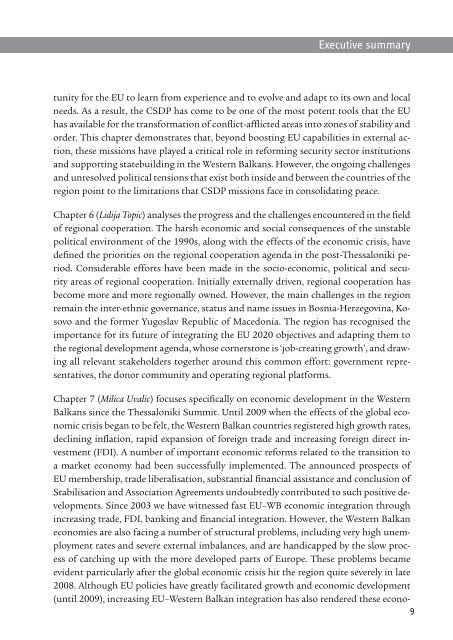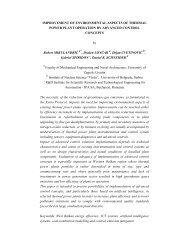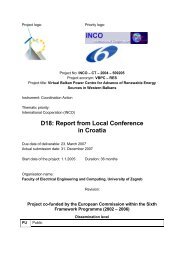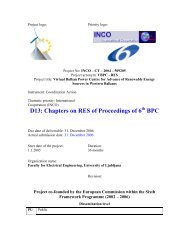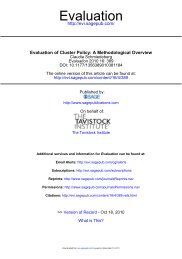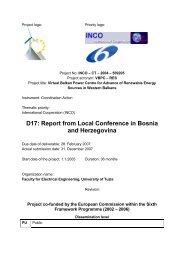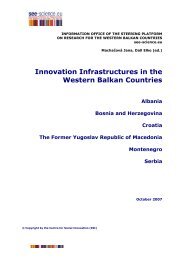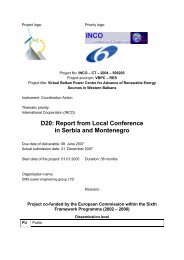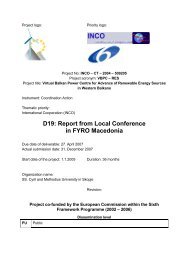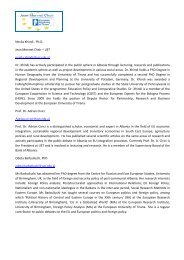The European future of the Western Balkans: Thessaloniki@10
The European future of the Western Balkans: Thessaloniki@10
The European future of the Western Balkans: Thessaloniki@10
You also want an ePaper? Increase the reach of your titles
YUMPU automatically turns print PDFs into web optimized ePapers that Google loves.
Executive summary<br />
tunity for <strong>the</strong> EU to learn from experience and to evolve and adapt to its own and local<br />
needs. As a result, <strong>the</strong> CSDP has come to be one <strong>of</strong> <strong>the</strong> most potent tools that <strong>the</strong> EU<br />
has available for <strong>the</strong> transformation <strong>of</strong> conflict-afflicted areas into zones <strong>of</strong> stability and<br />
order. This chapter demonstrates that, beyond boosting EU capabilities in external action,<br />
<strong>the</strong>se missions have played a critical role in reforming security sector institutions<br />
and supporting statebuilding in <strong>the</strong> <strong>Western</strong> <strong>Balkans</strong>. However, <strong>the</strong> ongoing challenges<br />
and unresolved political tensions that exist both inside and between <strong>the</strong> countries <strong>of</strong> <strong>the</strong><br />
region point to <strong>the</strong> limitations that CSDP missions face in consolidating peace.<br />
Chapter 6 (Lidija Topic) analyses <strong>the</strong> progress and <strong>the</strong> challenges encountered in <strong>the</strong> field<br />
<strong>of</strong> regional cooperation. <strong>The</strong> harsh economic and social consequences <strong>of</strong> <strong>the</strong> unstable<br />
political environment <strong>of</strong> <strong>the</strong> 1990s, along with <strong>the</strong> effects <strong>of</strong> <strong>the</strong> economic crisis, have<br />
defined <strong>the</strong> priorities on <strong>the</strong> regional cooperation agenda in <strong>the</strong> post-<strong>The</strong>ssaloniki period.<br />
Considerable efforts have been made in <strong>the</strong> socio-economic, political and security<br />
areas <strong>of</strong> regional cooperation. Initially externally driven, regional cooperation has<br />
become more and more regionally owned. However, <strong>the</strong> main challenges in <strong>the</strong> region<br />
remain <strong>the</strong> inter-ethnic governance, status and name issues in Bosnia-Herzegovina, Kosovo<br />
and <strong>the</strong> former Yugoslav Republic <strong>of</strong> Macedonia. <strong>The</strong> region has recognised <strong>the</strong><br />
importance for its <strong>future</strong> <strong>of</strong> integrating <strong>the</strong> EU 2020 objectives and adapting <strong>the</strong>m to<br />
<strong>the</strong> regional development agenda, whose cornerstone is ‘job-creating growth’, and drawing<br />
all relevant stakeholders toge<strong>the</strong>r around this common effort: government representatives,<br />
<strong>the</strong> donor community and operating regional platforms.<br />
Chapter 7 (Milica Uvalic) focuses specifically on economic development in <strong>the</strong> <strong>Western</strong><br />
<strong>Balkans</strong> since <strong>the</strong> <strong>The</strong>ssaloniki Summit. Until 2009 when <strong>the</strong> effects <strong>of</strong> <strong>the</strong> global economic<br />
crisis began to be felt, <strong>the</strong> <strong>Western</strong> Balkan countries registered high growth rates,<br />
declining inflation, rapid expansion <strong>of</strong> foreign trade and increasing foreign direct investment<br />
(FDI). A number <strong>of</strong> important economic reforms related to <strong>the</strong> transition to<br />
a market economy had been successfully implemented. <strong>The</strong> announced prospects <strong>of</strong><br />
EU membership, trade liberalisation, substantial financial assistance and conclusion <strong>of</strong><br />
Stabilisation and Association Agreements undoubtedly contributed to such positive developments.<br />
Since 2003 we have witnessed fast EU–WB economic integration through<br />
increasing trade, FDI, banking and financial integration. However, <strong>the</strong> <strong>Western</strong> Balkan<br />
economies are also facing a number <strong>of</strong> structural problems, including very high unemployment<br />
rates and severe external imbalances, and are handicapped by <strong>the</strong> slow process<br />
<strong>of</strong> catching up with <strong>the</strong> more developed parts <strong>of</strong> Europe. <strong>The</strong>se problems became<br />
evident particularly after <strong>the</strong> global economic crisis hit <strong>the</strong> region quite severely in late<br />
2008. Although EU policies have greatly facilitated growth and economic development<br />
(until 2009), increasing EU–<strong>Western</strong> Balkan integration has also rendered <strong>the</strong>se econo-<br />
9


